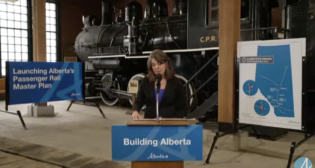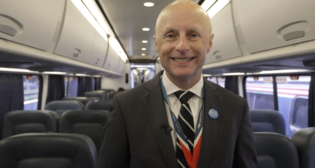
The road to irrelevance is paved with good intentions
Written by AdministratorA Railway Age editorial I posted on line last in June 2011 about the most recent legislative attempt to break up Amtrak and privatize the pieces drew a 99% favorable response. Here’s an excerpt:
“On June 15, we were introduced to the latest ‘Let’s Pull Amtrak Apart, Pulverize All the Pieces In a Blender, Dump It Out, and Get People Who Have No Idea What They’re Doing or Talking About Attempt to Mold Something Back Together’ bill. This is the ‘Competition for Intercity Passenger Rail in America Act,’ concocted by Rep. John L. Mica (R-Fla., pictured), Chairman of the House Transportation and Infrastructure Committee, and Rep. Bill Shuster (R-Pa.), Chairman of the Railroads, Pipelines, and Hazardous Materials Subcommittee. This bill is ‘a dramatic new direction that focuses on bringing competition to high speed and intercity passenger rail service across the country [that] incorporates competitive bidding and private sector involvement to bring high speed rail to the Northeast Corridor and improve intercity rail service nationwide.’
“What’s the point of all this private-sector mumbo-jumbo? This complex bill that Congressional staffers are being paid with your and my tax dollars to draft? This piece of proposed legislation that will most likely be tossed in the circular file and forgotten until, a few years from now, somebody resurrects, swallows, and regurgitates in another form? Well, there really isn’t any point.
“Why dismantle Amtrak? Why create something extremely complex out of something that, though certainly not ideal, is straightforward and has worked pretty well for 40 years? Something that was created for basically one purpose—to relieve our freight railroads from their obligation to operate important yet unprofitable passenger services?
“[I]f history is any indication, such legislative schemes are not going to do anything except misinform and confuse the public, needlessly worry Amtrak’s hard-working employees and distract them from doing their jobs, and force Amtrak’s management to spend countless hours defending the railroad, instead of running it. It’s like swatting at mosquitoes. You know they’re there and you know they can’t kill you, but nevertheless you’ve got to keeping expending energy that could be used doing other, more useful things than swatting at them because a) they’re an annoyance and b) they’re never really going to go away.”
The only unfavorable response came from the bill’s authors:
“Your editorial criticizing our proposal to bring competition to America’s passenger rail service was myopic at best.”
(Editor’s note: I’m indeed very nearsighted. When I remove my eyeglasses, I can see up-close things very clearly.)
“Your observation that efforts under President Bush failed to reform passenger rail service is also incorrect. In fact, President Bush signed the first passenger rail reform bill in 11 years, the Passenger Rail Investment and Improvement Act of 2008, which set the blueprint for high speed rail and Amtrak reform.
“Your pessimism regarding our proposal to further reform and improve passenger rail service is unfounded.
“We support a national passenger rail system, and in fact, if we did not have an Amtrak to oversee the system, one would probably have to be established.
“We are not proposing to dismantle Amtrak. We support high speed rail, intercity passenger rail, and long-distance rail service.
“Amtrak proposed establishing high speed rail service in the Northeast Corridor under a plan that would take 30 years and $117 billion. However, we will all turn blue in the face if we expect Congress to give Amtrak that sum and wait three decades for high speed service currently available, as President Obama says, in Europe and Asia.
“We believe the Northeast Corridor is a valuable asset that can attract private capital, which will speed up the project and also speed up passenger rail service in the corridor.
“We believe with private, local, state and federal involvement, we can lower federal subsidies, improve service and routes, and actually expand employment and development.
“We have also committed to preserve rail labor benefits along the way.
“Yes, other proposals aimed at starving Amtrak of funding and closing it down, privatizing the whole kit and caboodle, have failed. We believe however that we can and must succeed in introducing competition for the sake of achieving high speed rail service and improving America’s passenger rail service and Amtrak.”
I don’t doubt that Mica and Shuster have good intentions (allow me to clarify—good to them). I also don’t doubt that well-meaning friends like these may push Amtrak closer to the abyss of irrelevance.
To paraphrase Saint Bernard of Clairvaux, who wrote, “L’enfer est plein de bonnes volontés et désirs” (“Hell is full of good wishes and desires”), the road to irrelevance is paved with good intentions.



